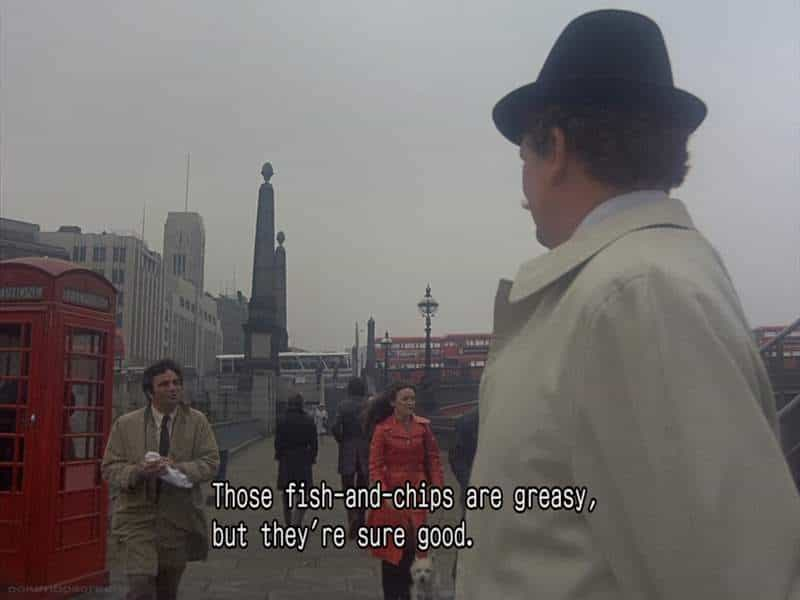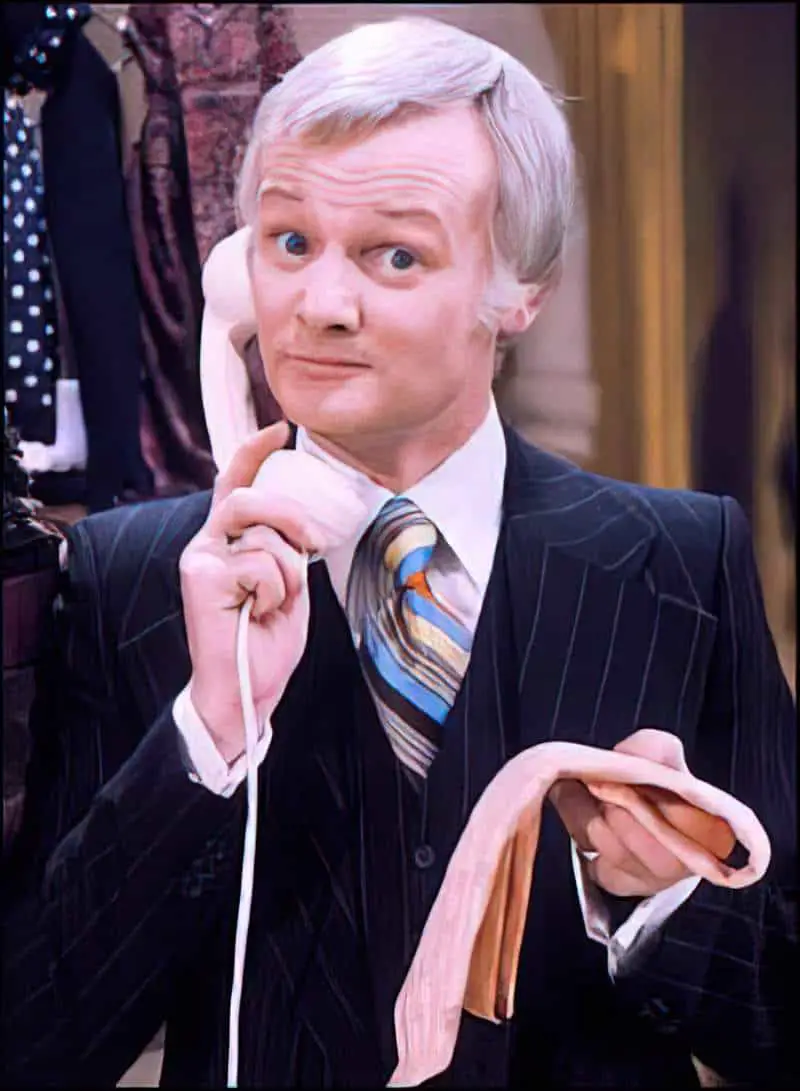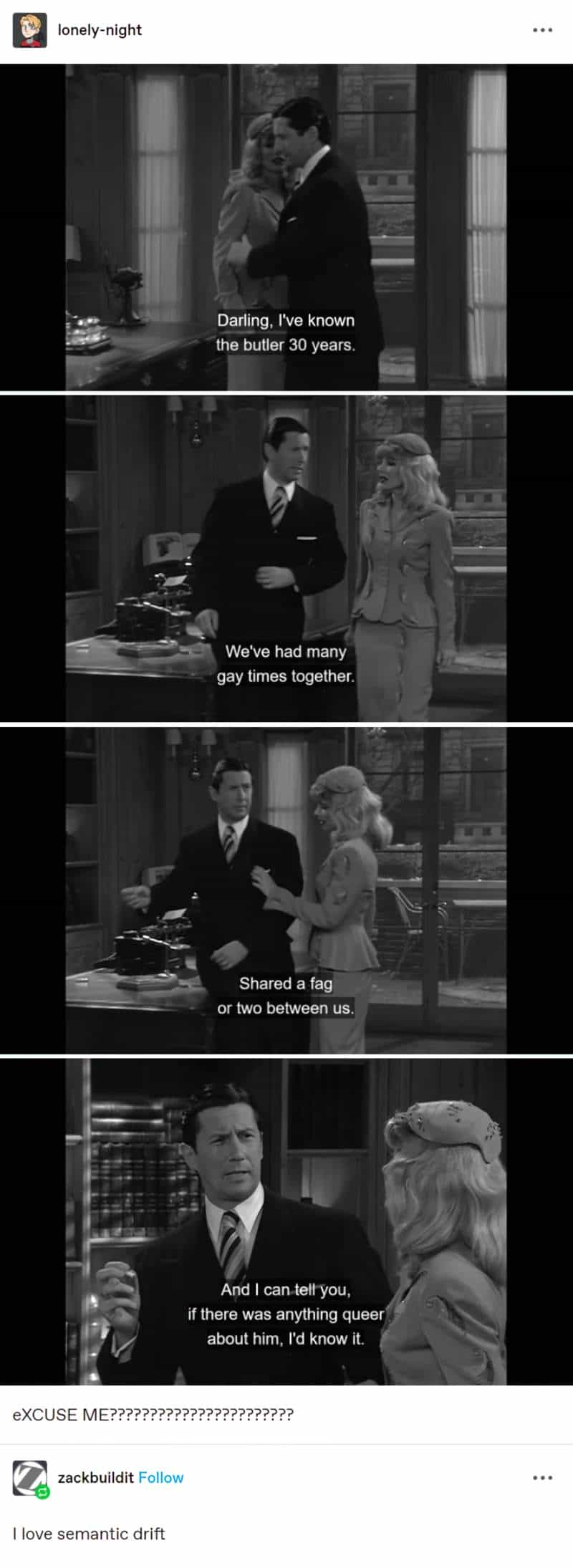“The Butler” is a lesser-known short story by Roald Dahl. Find it in Eight Further Tales of the Unexpected, included in The Collected Short Stories of Roald Dahl, first published 1992.
WHERE TO LISTEN
I recommend listening to the story especially if you’re not British, because the difference in accent is vital to understanding the class conflict in this short story.
DISCUSSION QUESTIONS FOR “THE BUTLER” BY ROALD DAHL
- Dahl named the Sausage King ‘Mr Cleaver’. What can you say about the significance of this name?
- Describe the butler. He arrives on the page in statu nascendi (without backstory) but we might deduce what his life may have looked like until now. What do you imagine for Tibbs?
- Dahl created another butler called Tibbs in one of his children’s stories. Which story and where did the butler work?
- How does Mrs Cleaver feel about moving to London, and what does this say about the Cleavers’ relationship?
- Dahl uses Northern grammatical constructions on the page. Give some examples of how the Cleavers speak a different dialect from the butler.
- Why do you think Dahl chose wine to illuminate class difference, aside from the fact that wine varies hugely in price and is therefore a strong class marker?
- We eventually learn what Tibbs the butler has been up to. What was he likely scheming all along?
- Why do you think he and the chef own a small car together and how did it come to be waiting out front?
- What do you think Tibbs and the French chef will do now?
- In the end, George Cleaver is unable to appreciate fine wines despite trying his best. What does this story say about class and taste?
SETTING OF “THE BUTLER”
PERIOD
I would say this story is set around the same era as Kazuo Ishiguro’s The Remains of the Day. The 1950s marked the dying days of the aristocracy who employed a full staff in the house.
It could also be set in the 1970s, the era which gave us To The Manor Born.
LOCATION
The Sausage King moves with his wife from The North to Chelsea. Knightsbridge, the City of Westminster, and Chelsea are traditionally posh areas of London.
TECHNOLOGY CRUCIAL TO THIS PARTICULAR STORY
Roald Dahl uses wine to illuminate differences in taste between England’s socioeconomic classes.
LEVEL OF CONFLICT
The chef and butler of this story are perhaps recently laid-off house staff who had previously served aristocracy might have found themselves freshly out of work. With no qualifications outside serving a very niche clientele, these men have found themselves reluctantly attending to the needs of the crass nouveau riche. No one else could afford to employ them.
Roald Dahl’s “The Butler”, like Kazuo Ishiguro’s The Remains of the Day are stories about a very specific period in 20th century Britain — the downfall of the noble household with its many waitstaff and automatic respect afforded to the noble inhabitants.
Until the World Wars came along and changed everything up, the staff of an aristocratic household tended to believe wholesale very old ideas about nobility — that the aristocratic class were simply a better class of human. That justified spending one’s entire life serving them.
Kazuo Ishiguro’s novel subverts the blind loyalty of a butler by replacing the butler’s ‘respectable’ aristocrat with a newly rich American who knows far less about English upper-class etiquette than Stevens. The American has employed Stevens because he wants to appear aristocratic.
Likewise, To The Manor Born lampoons an immigrant who has gotten rich by owning supermarkets. He has bought a house in the country
When Mr Stevens goes on a road trip to meet a woman from his past, he is forced to confront his life choices. As it turns out, he spent his entire life blindly serving a war criminal.
There’s a scene in The Remains of the Day in which the aristocrat’s friends make fun of Mr Stevens, the butler. Whereas Mr Stevens remains loyal and wilfully ignorant til the last, the men in Roald Dahl’s story react differently: These tricksters have the last laugh.
STORY STRUCTURE OF “THE BUTLER”
SHORTCOMING
George Cleaver made money from sausages. Dahl has given him a symbolic name, since butchers use cleaver knives.
‘Cleave’ is one of those weird words with two opposite meanings. These words are called contranyms. ‘Cleave’ means to separate or cut with a tool, but also means ‘to be in close contact with’. To separate and to join, at once. George Cleaver separates himself from his native Northern self and attempts to join high society down in London, where he will be joined by staff who cut him off socially.
The Sausage King Mr Cleaver means to fit in with the respectable wealthy of London, probably because of some deep insecurity about status.
The problem is, he is not that sort of person so even if he tries to fit in, the mask of aristocracy is bound to slip. He doesn’t have a taste for fine wine; he enjoys the taste of vinegar, probably because he’s been brought up on good old English fish and chips.

DESIRE
If Mr Cleaver could be content to be who he really is, he’d be happier staying put up North, surrounded by his long-term friends. But no. He must have the best, and he has a fixed idea about what counts as The Best.
OPPONENT
The new ‘friends’ Mr Cleaver makes in London are happy to take advantage of his wealth, and though no one reading this would call them ‘friends’, nor are they enemies. For the purposes of the story, they are cardboard cut-outs. His wife, too, is resigned to doing as her husband suggests.
Tibbs the butler is Cleaver’s opponent. Whereas the Sausage King wishes to pass himself off as cultured, the butler wishes to reveal his lower-class background. (We eventually learn the chef is in cahoots.)
Note that Dahl also has a butler named Tibbs in The BFG. Sophie and the Giant meet him as he’s working at Buckingham Palace.
The name Tibbs is usually derived from the name Tebb, meaning ‘son of Theobold’ an ancient name meaning ‘people-bold’. Variants of this name include:
- Tebb
- Tibb
- Tebbs
- Tibbitts
- Tibbits
- Tibbutt
- Tibbets
- Tibbet.
This name is usually of English descent and is found in many ancient manuscripts in that country.
Behind the Name
PLAN
The butler will not be disrespected. He sees himself as higher in rank than the Sausage King and doesn’t have it in himself to pretend otherwise.
I figure he’ll stay in this house for as long as he can stand the indignities, all the while purchasing the world’s most expensive wines on his employer’s account, swapping them out for vinegar Spanish cheap versions, then selling them off to rich associates and pocketing the extra cash. (No doubt he’s enjoying some of that wine himself, though he may be overstating this to rub it in.)
THE BIG STRUGGLE
When the Sausage King disses the butler in front of his wealthy associates, that’s when the butler takes that opportunity to humiliate his crass employer by revealing the wine scam.
ANAGNORISIS
Dahl is sure to tell us that the chef and the butler own a car together. This suggests a close relationship of some kind. We might argue these men are in business together, going from grand house to grand house, ripping off the nouveau riche until they just can’t stand it anymore. Then they take off in their car, which is basically a business vehicle.
However. This butler has refined taste. In men, a keen eye for matters of fashion and class markers is a stereotypically gay attribute, showcased in modern shows such as Queer Eye, and in Dahl’s era, sit-coms such as Are You Being Served?

By the 20th century, the job of a butler drew disproportionately from the gay community, and this was well-known. When staff shrank, butlers were more decorative. A good butler was good-looking, preferably tall, and exquisitely well-groomed.
So, like Barrow in Downton Abbey, the butler in Dahl’s short story is recognizable as a modern gay man, even if Roald Dahl never uses that word. Dahl was unable to write overt queerness while still appealing to a mainstream audience. This was of course due to widespread queerphobia of the 20th century. It’s probably just as well that, in stories such as “Henry Sugar” and in this one, ambiguous queer coding was as close as Dahl ever got. The man wasn’t exactly renowned for his liberal views.

NEW SITUATION
I see these two going to another big house to rip off another rich immigrant to London hailing from the North. That ‘French’ chef may not even be French. I have an old flatmate (from Devon) who lived in France for a few years as a very young man, learned to speak French very well, then regularly pretended to be a French native when picking up English girls at bars. He would affect a French accent when speaking his native English and search around trying to remember a common word. He had great success with this pick-up technique, though it never did sit well with me.
Dahl’s short story “The Butler” is a subversion of a traditional butler story, in which the archetypal butler is so very dedicated to his house and master that he cannot bear to leave the premises, not even in the afterlife when, he may even come back as a ghost.

EXTRAPOLATED ENDING
You know what? For all we know, this butler may be the son of aristocracy himself, cut off from his inheritance. All we really know about this fellow is that he has excellent taste in wine, which — according to the laws of the story itself — means he’s been up close and personal with luxury goods as a youngster.
Since the nouveau riche Mr Cleaver from the uncultured North was never able to appreciate fine wine despite his best efforts, the message that comes through in this short story is ultimately a conservative one. Dahl reinforces the idea that taste is not learned but innate. Or if taste can be learned, it must be learned very young — via experience, not from a book.
RESONANCE
The nouveau riche moving into the most expensive parts of England then trying to pass as real aristocracy describes a very specific period in the 20th century. New wealth is no longer sneered at. In fact, it’s more like the reverse. By the time Kazuo Ishiguro published The Remains of the Day in the 1980s, England was firmly in the era of the anti-aristocracy story.
